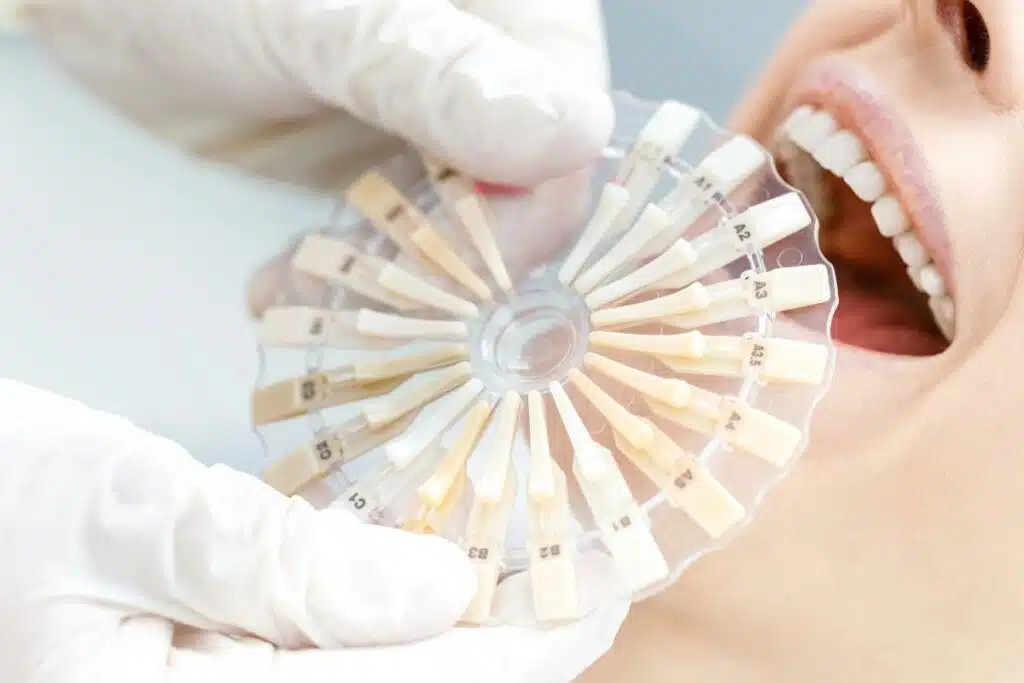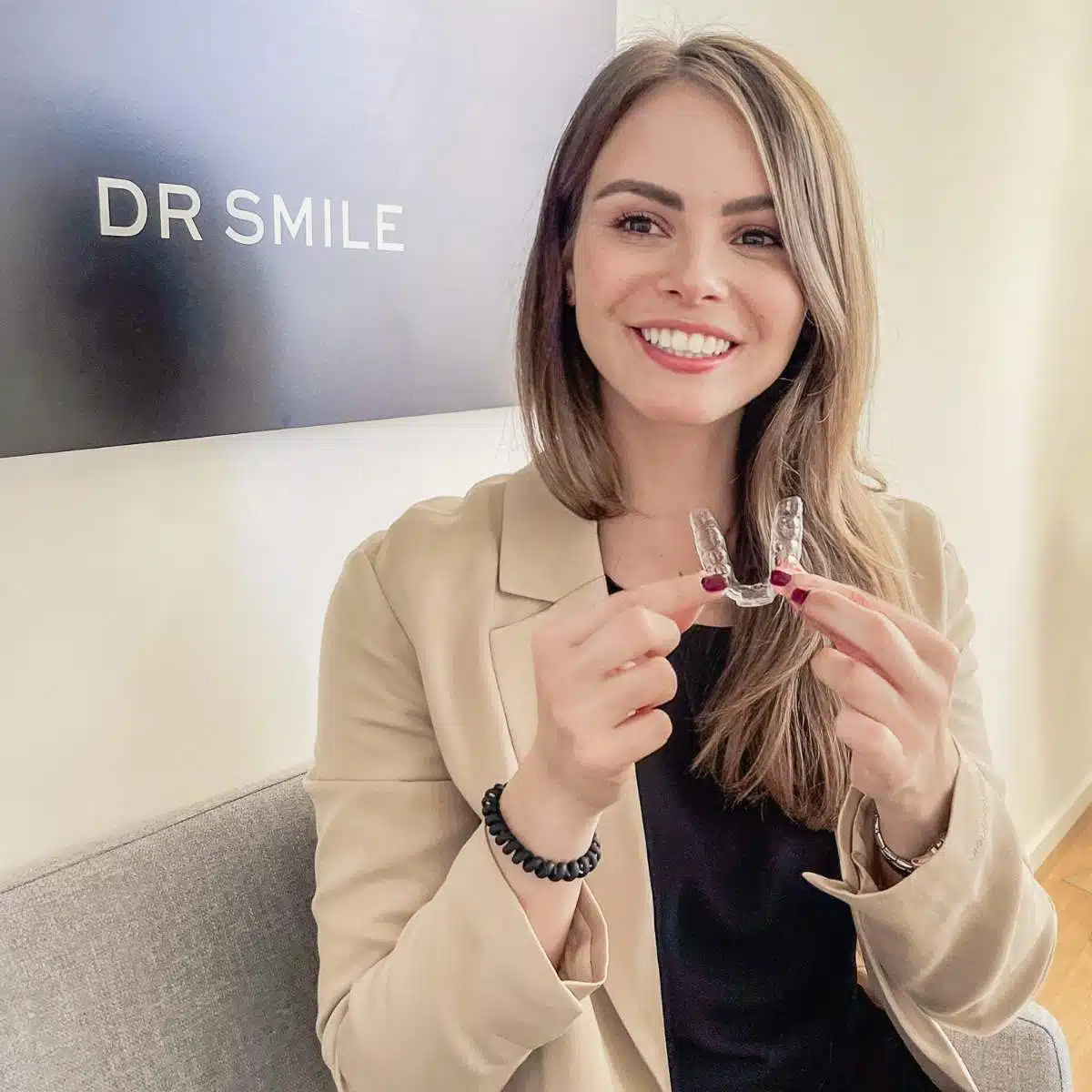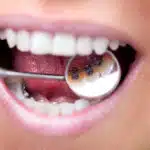Here you will find all the information you need about dental crowns: How much do they cost, what are the possible applications and what materials are available?
Dental crowns are one of the most common and versatile solutions in modern dentistry when it comes to restoring damaged or severely worn teeth.
But what exactly is a dental crown, when is it needed, how much does it cost and who covers the costs?
In this detailed article, you will learn everything you need to know about dental crowns.
| Get 150 € discount on your dental correction! |

Book a consultation appointment now at a nearby DrSmile partner practice and find out if teeth straightening with aligners is right for you.
The appointment is completely non-binding and does not involve any costs.
With the code “THATSMILE150” you will receive 150 € discount on the treatment.
What is a dental crown?
A dental crown is an artificial cap that is placed over a damaged tooth to protect and stabilize it and restore its natural shape and function.
Crowns are usually made from materials such as ceramic, metal, plastic or a combination of these materials.
They are specially made for you so that they fit your teeth perfectly and blend in seamlessly with your dentition.
Dental crowns are particularly important when a tooth is so badly damaged that fillings or other restorations are no longer sufficient.
They cover the entire visible part of the tooth and thus offer maximum protection and stability.

When are dental crowns used?
Dental crowns may be required in a variety of situations, including:
- Severe damage due to decay: If a tooth is severely damaged by decay and a filling is not sufficient, a crown may be required to stabilize the tooth and restore its function.
- After a root canal treatment: After a root canal treatment, the affected tooth is often weakened and more susceptible to fractures. A crown helps to protect the tooth and prolong its life.
- Tooth fractures: If a tooth is fractured due to an accident or other influences, a crown can be used to restore the structure of the tooth and prevent further damage.
- Teeth with large fillings: If a tooth becomes unstable due to a large filling, a crown can help to protect the tooth and restore its stability.
- Aesthetic reasons: Dental crowns can also be used for aesthetic reasons to improve the shape, size or color of a tooth. This is particularly the case if the natural tooth is discolored, worn or misshapen.
- Anchoring bridges: When a dental bridge is placed, the adjacent teeth are often fitted with crowns to support and anchor the bridge.
What types of dental crowns are there?
There are different types of dental crowns, depending on the material and intended use:
- All-ceramic crowns: These crowns are made entirely of ceramic or porcelain and are particularly suitable for the front teeth as they look very natural. They are biocompatible and well tolerated.
- Metal-ceramic crowns: These crowns have a metal core that provides stability and an outer layer of ceramic that matches the tooth color. They offer a good mix of strength and esthetics.
- Gold crowns: These crowns are made of a gold alloy and are extremely durable. Due to their striking color, they are usually used in the posterior region of the dentition.
- Zirconia crowns: Zirconium oxide is a very stable and at the same time aesthetic material used for crowns. Zirconia crowns are metal-free and are characterized by their high strength and natural appearance.
- Plastic crowns: These crowns are made of plastic and are often used as a temporary solution before a permanent crown is placed. They are less expensive, but also less durable.

How is a dental crown fitted?
A dental crown is usually inserted in several steps:
- Preparation of the tooth: First, the affected tooth is prepared. This includes removing decay and grinding down the tooth to make room for the crown.
- Impression taking: An impression of the tooth is then taken, which serves as a template for the production of the crown. In some practices, this can also be done digitally.
- Temporary crown: While the final crown is being made, you will usually receive a temporary crown to protect the tooth until the final crown is fitted.
- Inserting the crown: Once the finished crown is ready, it is placed on the prepared tooth and secured with a special cement. The dentist checks the fit and bite to ensure that the crown fits perfectly.
How much does a dental crown cost?
The cost of a dental crown can vary greatly depending on the material, dental practice and region. On average, the cost of a crown in Germany is between 300 and 1,200 euros per tooth.
- All-ceramic crowns: These are usually the most expensive and can cost between 700 and 1,200 euros.
- Metal-ceramic crowns: These usually cost between 500 and 900 euros.
- Gold crowns: The price of gold crowns can fluctuate greatly, depending on the current price of gold, but is often between 600 and 1,000 euros.
- Plastic crowns: These are the cheapest and usually cost between 300 and 600 euros.

Who covers the cost of a dental crown?
The assumption of costs for dental crowns depends on your health insurance:
- Statutory health insurance: The statutory health insurance fund usually pays a fixed subsidy based on the findings. This fixed subsidy covers around 50% of the cost of simple, medically necessary treatment. If you have a well-maintained bonus booklet, the subsidy can increase to up to 65%. You will have to cover the remaining costs yourself or take out supplementary dental insurance.
- Private health insurance: Private health insurance companies usually cover a larger proportion of the costs, often even 100%, depending on your individual contract. It is worth checking the exact terms and conditions of your contract.
- Supplementary dental insurance: If you have supplementary dental insurance, this can cover a large part of the remaining costs, depending on the tariff and agreement.
Conclusion: When does a dental crown make sense?
Dental crowns are a proven and versatile solution when it comes to protecting damaged teeth and restoring their function.
They not only provide protection and stability, but can also deliver aesthetically pleasing results.
If you have severe tooth damage or are looking for an aesthetic improvement, a dental crown could be the right choice for you.
Your dentist will advise you individually and find the best solution for your dental health.
Not only can you extend the life of your teeth with a dental crown, you can also restore your smile to its former glory.
| Get 150 € discount on your dental correction! |

Book a consultation appointment now at a nearby DrSmile partner practice and find out if teeth straightening with aligners is right for you.
The appointment is completely non-binding and does not involve any costs.
With the code “THATSMILE150” you will receive 150 € discount on the treatment.
FAQs on the subject of dental crowns
Here we answer a few of the most frequently asked questions about dental crowns.
What is a dental crown and what is it used for?
A dental crown is a protective cap that is placed over a severely damaged or worn tooth.
It is used to stabilize and protect the tooth and restore its shape and function.
Crowns are often used when fillings or other restorations are not sufficient to repair a tooth.
What types of dental crowns are there?
There are different types of dental crowns, including all-ceramic crowns, metal-ceramic crowns, gold crowns, zirconia crowns and resin crowns.
Each type has its own advantages and disadvantages, which differ in terms of aesthetics, durability and cost.
When is a dental crown necessary?
A dental crown is necessary if a tooth is severely damaged, for example due to caries, a fracture or after root canal treatment.
A crown can also be useful for severely worn teeth or for aesthetic improvement.
How long does a dental crown last?
The lifespan of a dental crown depends on various factors, such as the material used, oral hygiene and dental care.
As a rule, dental crowns last between 10 and 15 years, but with good care and regular visits to the dentist, they can last even longer.
How much does a dental crown cost?
The cost of a dental crown varies depending on the material and dental practice.
On average, crowns cost between 300 and 1,200 euros per tooth.
All-ceramic crowns are generally more expensive than metal-ceramic crowns or plastic crowns.
Does health insurance cover the cost of a dental crown?
The statutory health insurance fund usually pays a fixed subsidy for the cost of a dental crown, which is based on a simple, medically necessary standard.
The subsidy covers around 50% of the costs, but can rise to up to 65% with a well-maintained bonus booklet.
Private health insurance and supplementary dental insurance can cover further costs.
How is a dental crown fitted?
The process begins with the preparation of the tooth, where decay is removed and the tooth is ground down to make room for the crown.
An impression of the tooth is then taken and a temporary crown is fitted.
Once the final crown has been made, it is placed on the tooth and permanently fixed in a second appointment.
Can a dental crown develop caries?
Although the crown itself is not affected by decay, the underlying tooth can develop decay, especially at the edge of the crown, if oral hygiene is neglected.
It is therefore important to continue to clean the teeth thoroughly and to visit the dentist regularly.
Is a dental crown visible?
Whether a dental crown is visible depends on the material and the position of the tooth.
All-ceramic crowns and zirconia crowns are designed to look like natural teeth and are inconspicuous, especially in the anterior region.
Metal-ceramic crowns and gold crowns may be visible depending on their position in the mouth.
What should I bear in mind after having a dental crown fitted?
After inserting a dental crown, you should initially avoid hard and sticky foods so as not to strain the crown.
It is normal for the tooth to be a little sensitive in the first few days.
Pay attention to thorough oral hygiene to avoid tooth decay at the edge of the crown and visit your dentist regularly for check-ups.



Leave a Reply